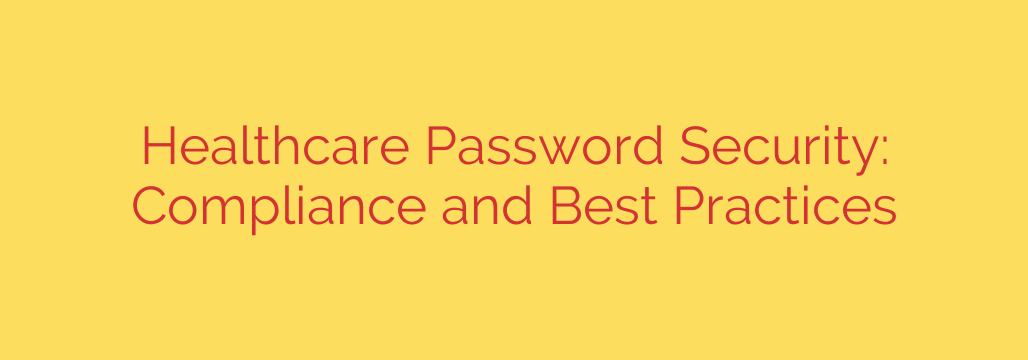
Protecting Patient Data: A Guide to Healthcare Password Security and HIPAA Compliance
In the healthcare industry, data security isn’t just a best practice—it’s a legal and ethical mandate. Protected Health Information (PHI) is one of the most sensitive and valuable types of data, making healthcare organizations a prime target for cybercriminals. At the core of defending this critical information lies a foundational element: robust password security. A weak password policy can be the single point of failure that leads to a devastating data breach, severe financial penalties, and a catastrophic loss of patient trust.
This guide explores the essential components of a strong healthcare password security strategy, aligning with HIPAA requirements and modern cybersecurity best practices to safeguard patient data effectively.
The High Stakes of Weak Passwords in Healthcare
A compromised password in a healthcare setting is more than an inconvenience; it’s a direct threat to patient safety and privacy. Stolen credentials can grant attackers access to electronic health records (EHRs), billing information, and personal identifiers. This information is highly sought after on the dark web for identity theft, insurance fraud, and extortion.
The consequences of a breach are severe:
- HIPAA Violations: Non-compliance can result in fines ranging from thousands to millions of dollars per violation.
- Reputational Damage: Patients entrust providers with their most personal information. A breach can irreparably damage an organization’s reputation.
- Operational Disruption: Recovering from a cyberattack can halt operations, cancel appointments, and put patient care at risk.
Understanding HIPAA’s Password Requirements
The Health Insurance Portability and Accountability Act (HIPAA) Security Rule provides a framework for protecting electronic PHI (ePHI). While HIPAA does not specify exact password length or complexity rules, it mandates that covered entities implement technical policies and procedures for access control. This puts the responsibility on organizations to create and enforce a password policy that adequately protects their systems.
Key HIPAA Security Rule provisions related to password security include:
- Unique User Identification: Each user must have a unique name and/or number for identification and tracking. Shared or generic logins are a major compliance violation.
- Access Control Procedures: Organizations must have documented procedures for authorizing, establishing, and modifying access to ePHI.
- Authentication: Covered entities must implement procedures to verify that a person or entity seeking access to ePHI is the one claimed.
Essentially, HIPAA requires you to conduct a risk analysis and implement “reasonable and appropriate” security measures. In today’s threat landscape, a weak or unenforced password policy is neither reasonable nor appropriate.
Best Practices for an Ironclad Healthcare Password Policy
To build a defense-in-depth security posture and meet compliance standards, healthcare organizations must go beyond the minimum and adopt modern password best practices.
1. Enforce Strong Password Complexity and Length
The foundation of a secure password is its resistance to being guessed or brute-forced.
- Length is Key: Require a minimum password length of 12-14 characters. Longer passwords are exponentially more difficult to crack.
- Embrace Complexity: Mandate the use of a mix of uppercase letters, lowercase letters, numbers, and special characters (!, @, #, $, etc.).
- Avoid Predictable Patterns: Your policy should prohibit the use of common dictionary words, sequential numbers (e.g., “12345”), or personal information like names, birthdates, or the organization’s name.
2. Implement Multi-Factor Authentication (MFA)
Multi-factor authentication is arguably the single most effective control you can implement to secure accounts. MFA requires users to provide two or more verification factors to gain access. This means that even if a cybercriminal steals a password, they cannot access the account without the second factor (e.g., a code from a mobile app, a text message, or a fingerprint). For all systems containing ePHI, especially for remote access, MFA should be considered mandatory.
3. Strategic Password Expiration and History
While forcing frequent password changes can sometimes lead to weaker password habits (e.g., “Password123!” to “Password124!”), a strategic approach is still necessary.
- Set a Reasonable Expiration Period: A 90-day password expiration policy is a common and effective standard.
- Prevent Password Reuse: Enforce a password history policy that prevents users from reusing their last 10-12 passwords. This stops them from cycling between a few old favorites.
4. Institute Account Lockout and Monitoring
To thwart automated brute-force attacks, your system must be configured to automatically lock a user account after a certain number of failed login attempts.
- Configure Account Lockouts: A best practice is to lock an account for a set duration (e.g., 15-30 minutes) after 5-7 incorrect password attempts.
- Monitor Login Activity: Actively monitor for and investigate suspicious login activity, such as multiple failed attempts from an unknown location or logins occurring at unusual hours.
Beyond the Policy: Fostering a Culture of Security
A policy is only as effective as its implementation and the people who follow it. Technology alone cannot solve the security challenge.
- Continuous Employee Training: Regularly train all staff members on the importance of password security, how to spot phishing attempts, and the proper procedures for handling sensitive data. Human error remains a leading cause of data breaches, making education a critical defensive layer.
- Role-Based Access Control (RBAC): Ensure that employees only have access to the minimum amount of data necessary to perform their jobs. A clinician does not need access to financial systems, and an administrator does not need access to every patient’s clinical records. This principle of least privilege limits the potential damage if an account is compromised.
- Regular Audits: Periodically audit your access logs and user permissions to ensure the policy is being followed and that former employees have had their access revoked promptly.
Ultimately, securing patient data requires a proactive, multi-layered strategy where a strong password policy is the first line of defense. By combining technical controls like MFA with robust policies and ongoing employee education, healthcare organizations can significantly reduce their risk of a data breach and uphold their duty to protect patient privacy.
Source: https://www.helpnetsecurity.com/2025/08/20/healthcare-password-crisis/








